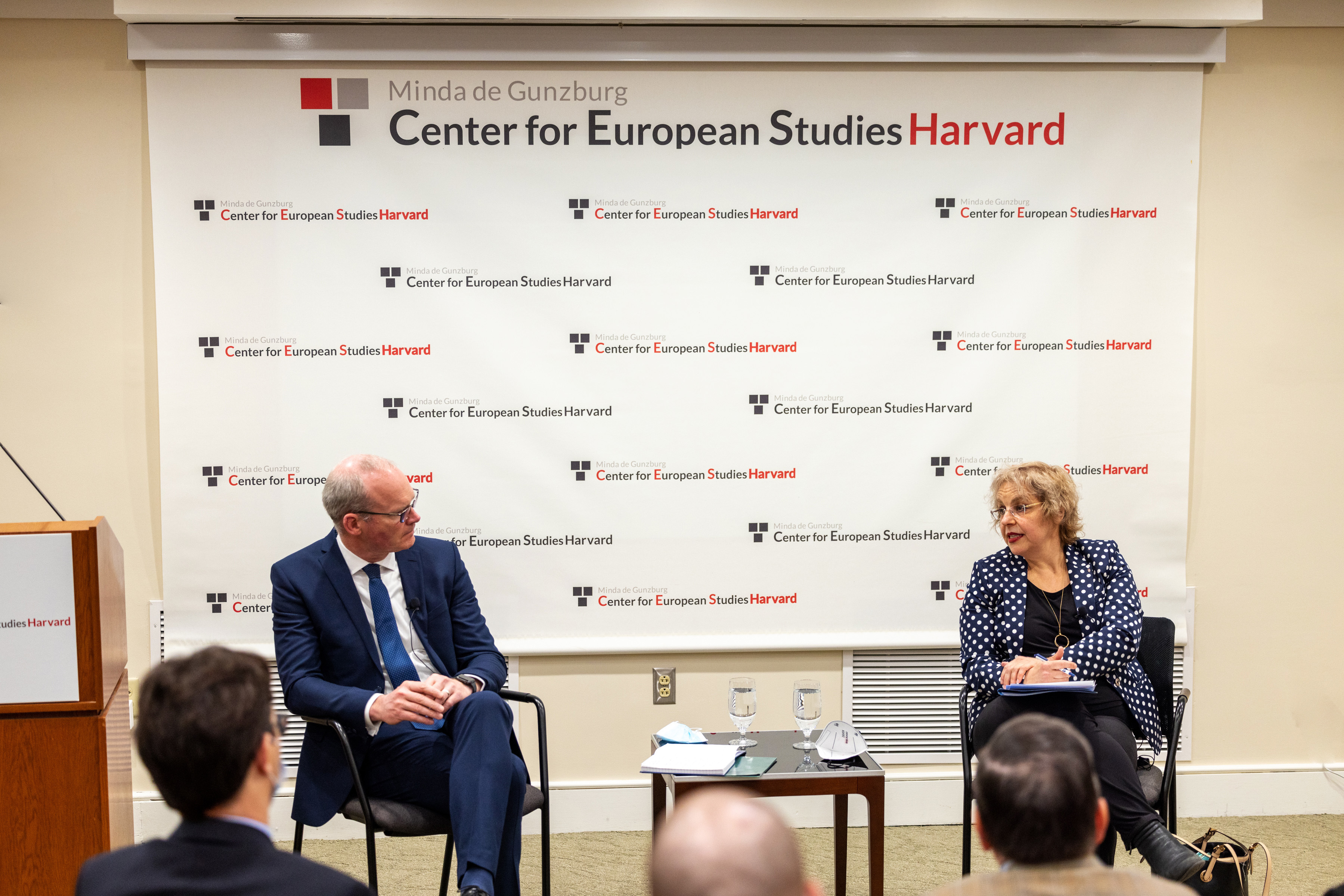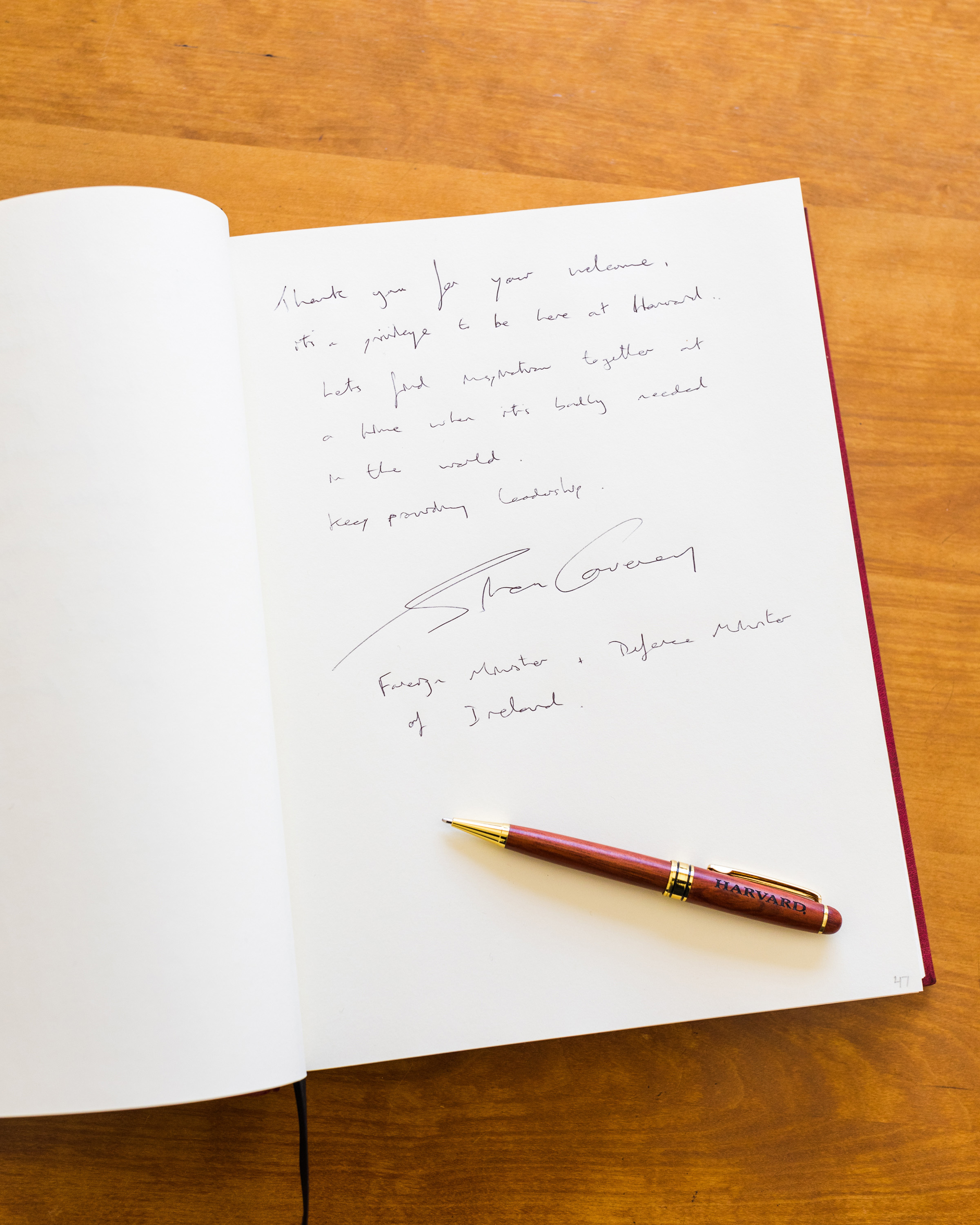The Harvard Gazette reported on the visit of Ireland's Minister of Foreign Affairs and Minister of Defense, Simon Coveney's visit to CES on April 29th, 2022.
The war in Ukraine has tested the entire European Union, but it has raised particular challenges for Ireland, which has remained officially neutral in military conflicts since the 1930s. On Friday, during a discussion at the Minda de Gunzburg Center for European Studies, Simon Coveney, Ireland’s minister for foreign affairs and minister of defense, predicted that the Russian invasion will likely bring about a shift in attitude in the island nation.
 Ofrit Liviatan, the event’s moderator, began the midday event by asking Coveney about how Ireland historically has viewed its neutrality. Coveney explained that it has meant that the country does not belong to any collective defense pact, although it has joined various peacekeeping missions. This stance, which has been encoded in Ireland’s Constitution, guarantees a certain independence. “Neutrality means Ireland decides when we get involved and when we don’t,” said Coveney. In this war, however, “Ireland is not neutral.”
Ofrit Liviatan, the event’s moderator, began the midday event by asking Coveney about how Ireland historically has viewed its neutrality. Coveney explained that it has meant that the country does not belong to any collective defense pact, although it has joined various peacekeeping missions. This stance, which has been encoded in Ireland’s Constitution, guarantees a certain independence. “Neutrality means Ireland decides when we get involved and when we don’t,” said Coveney. In this war, however, “Ireland is not neutral.”
The difference, he explained, is the “extreme brutality” of the Russian invasion. Recently back from Bucha, Ukraine, the minister spoke movingly about the atrocities perpetuated by Russian troops in this village outside Kyiv. Recalling “the raw emotion of standing over a mass grave” where 503 bodies had been recovered, he acknowledged that “those numbers will end up being a very small microcosm of the suffering and brutality.”
“This is a blatant breach of international law and of the UN charter,” he said. “There is no justification for what is happening in Ukraine.”
Going forward, he opined, “This war is changing the debate in Ireland.” In the future, he added, “I think the Irish people will be more open to collective approaches to security.” Ireland has so far refrained from sending military equipment to Ukraine, but it has sent non-lethal supplies, such as medical equipment and humanitarian aid.
 A shift on security will entail a reallocation of funds as well as change in policy. Currently, Ireland spends about 0.3 percent of its GDP on defense, which Coveney described as “roughly a quarter to a half of what other similar-sized countries in Europe spend. “We’re a complete outlier in what we spend on defense,” he said. “I don’t believe that’s sustainable in the future.”
A shift on security will entail a reallocation of funds as well as change in policy. Currently, Ireland spends about 0.3 percent of its GDP on defense, which Coveney described as “roughly a quarter to a half of what other similar-sized countries in Europe spend. “We’re a complete outlier in what we spend on defense,” he said. “I don’t believe that’s sustainable in the future.”
Serendipitously, Ireland has recently completed a 13-month budget reassessment, culminating in what the minister called a “strong report on increasing investment in defense.”
The EU as a whole faces different challenges. To start with, the partnership has never had a united foreign policy. “It’s not the United States of Europe,” Coveney explained. In addition, he pointed out, while U.K. and U.S. intelligence both warned of the invasion, the EU was taken by surprise. “The perceived wisdom of the EU was that this wouldn’t happen. It couldn’t happen on this scale,” he said.
